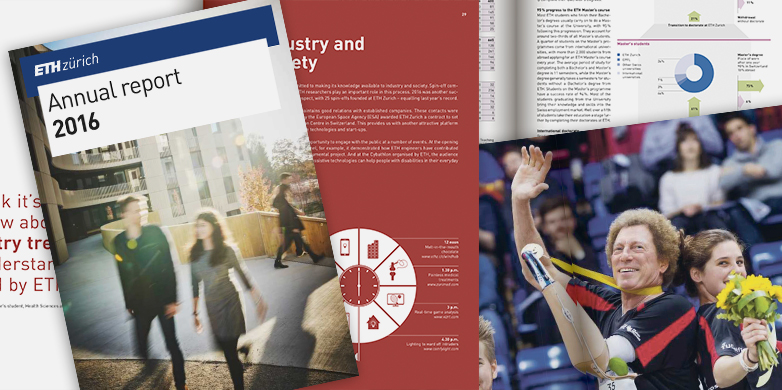Publication of Annual and Sustainability Reports
The ETH Zurich 2016 Annual Report provides an overview of the most important achievements, developments and events at the University over the past year, and is published alongside the 2015/2016 Sustainability Report.
A world record for the grimsel electric racing car, the opening of the Gotthard Base Tunnel and the new Arch_Tech_Lab laboratory with real-world conditions were just some of last year's highlights at ETH Zurich. The University presents the most important events and developments in its recently published 2016 Annual Report.
"A personal highlight for me was the Cybathlon, where people with physical disabilities used advanced assistive technologies to compete in a sports tournament," says Lino Guzzella, President of ETH Zurich. The report includes a ten-page photo series showcasing this world premiere organised by ETH .
The 2016 Annual Report also includes the University's detailed annual financial statements. ETH CFO Robert Perich: "ETH Zurich has produced a highly professional report giving a comprehensive, transparent account of the past year which meets stakeholders' ever-growing expectations regarding good university governance."
More students – more courses
A look at the numbers shows that ETH Zurich remains a popular place to study. The total number of students rose slightly year-on-year to reach a record high of 19,815, and the percentage of women increased to 31.1 percent (+0.6 percent).
The financial figures also reveal moderate growth: operating expenses amounted to 1,642 million Swiss francs in total, a 2.4 percent increase on the previous year. Operating revenue climbed 3.3 percent to 1,768 million Swiss francs. The increasingly important third-party revenues are worthy of particular mention: the rise of 7.2 percent far outpaced the 1.9 percent growth in the federal contribution.
ETH Zurich will expand its range of courses in the year ahead, with a new Bachelor's programme in medicine for 100 students set to launch in autumn 2017. ETH also wants to strengthen its continuing education programme: for public-sector employees, for example, the newly founded Swiss School of Public Governance will offer two certificate (CSA) courses on leadership issues.
Collaborative research, shared knowledge
In 2016, ETH researchers once again made important contributions to both fundamental research and applied fields – whether in astronomy, materials science or biotechnology. Cooperation with other institutions is particularly vital for successful research. With this in mind, ETH Zurich is taking part in a large-scale, interdisciplinary project run by the University Medicine Zurich organisation, aiming to pool skin research across the city. In partnership with EPFL, it is also establishing a new centre for data science.
Spin-off companies play a key role in making knowledge acquired at the University available to industry and society. Twenty-five start-ups were founded in 2016, equalling last year’s record. ETH Zurich also won a contract from the European Space Agency to set up a Swiss Business Incubation Centre, which will provide additional support to young entrepreneurs.
Sustainability as an overarching responsibility
Sustainability is a top priority for ETH Zurich. "Our University plays a central role in the development of ecologically and economically viable solutions to challenges in the fields of energy, the environment and sustainability, and we must lead by example," says Lino Guzzella. ETH has documented its social commitments over the last two years in the new Sustainability Report 2015/2016.
This report focuses on the four key areas of research, teaching, campus and dialogue with the public. It includes 45 targets related to the environment, sustainable teaching and diversity, presents relevant figures, and shows where there is a need for action. The report also provides information on current projects undertaken by the University, such as the mobility platform founded in 2016 with the aim of reducing CO2 emissions and energy consumption in the fields of campus mobility, business travel and logistics.

